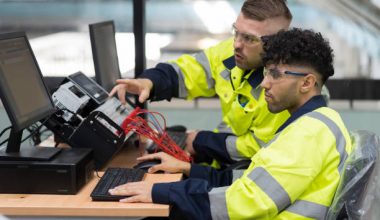If you have children in school or work in education, you may have heard of Ofsted. But what exactly is Ofsted and why is it important?
Ofsted, or the Office for Standards in Education, Children’s Services and Skills, is a non-ministerial government department in the UK. They are responsible for inspecting and regulating schools, colleges, and other educational institutions to ensure they are providing high-quality education and care.
In this article, we will examine the purpose and responsibilities of Ofsted, how they conduct inspections, and why their work is crucial for maintaining educational standards and promoting the well-being of children and young people.
Understanding Ofsted’s role can empower parents, educators, and policymakers to work together to create a better educational environment for all. Let’s ride!
Table of contents
- What Is Ofsted?
- What Is Ofsted’s Role?
- What Are The 4 Ofsted Grades?
- What Are Ofsted Requirements?
- Why Is Ofsted Grading Necessary?
- How Much Notice Do Schools Get Before An Ofsted Inspection?
- What Happens During an Ofsted Inspection?
- What Happens After An Ofsted Inspection?
- What Happens Next When A School Is Rated Inadequate By Ofsted?
- Frequently Asked Questions On What Is Ofsted
- Conclusion
- References
- We Also Recommend
What Is Ofsted?
Ofsted is a government organization that stands for The Office for Standards in Education, Children’s Services, and Skills.
Ofsted reports directly to parliament and, by law, they must inspect schools to provide information for parents and carers, as well as promote improvement and hold schools to account.
When notifying a school of an inspection, Ofsted inspectors will typically give one day’s notice. However, ‘no notice’ inspections can be required if there is a serious reason for an immediate Ofsted inspection, such as a safeguarding issue.
READ ALSO: Best Colleges for Business Majors & Management in 2024
What Is Ofsted’s Role?
Ofsted’s aim is basically to improve lives by raising standards in education and children’s social care.’ There are various ways that Ofsted does this. They include:
Inspecting
Ofsted inspects maintained schools and academies, certain private schools, colleges, apprenticeship providers, and prison education. These consist of sixth-form institutions, child referral services, and special faith schools.
Additionally, it conducts inspections of childcare facilities, local governments, adoption and foster care organizations, and teacher preparation programs.
Regulating
To ensure that they are appropriate for kids and young people who may be vulnerable, Ofsted supervises a variety of early childhood and children’s social care services.
By conducting regular inspections, Ofsted assesses various aspects of an institution, including the quality of teaching, leadership, safeguarding procedures, and overall effectiveness.
The findings from these inspections help identify areas of improvement and best practices to ensure that all students have access to a safe and nurturing learning environment.
Ofsted plays a crucial role in maintaining standards in education and promoting continuous improvement in schools.
SEE ALSO: When Do Universities Get Your A-Level Results?
Reporting
To raise the general level of education and training in the UK, Ofsted releases reports. It alerts decision-makers about the effectiveness of these services.
How Important Are Ofsted Ratings?
The issue of what level Ofsted grades matter typically arises when parents select the schools their children will attend, making it crucial for both schools and parents. Before choosing a school, parents frequently visit its website to discover if it has received at least a “good” rating from Ofsted.
Ofsted ratings are the third most important factor to parents when choosing a school according to a 2015 survey of 1000 parents in the UK.
Ofsted ratings provide a mechanism for holding educational and childcare providers accountable for the quality of their services. Institutions that receive lower ratings, such as “Requires Improvement” or “Inadequate,” may face increased scrutiny and intervention to improve their performance.
For institutions, Ofsted ratings serve as a benchmark for their performance. A lower rating can signal the need for improvement in various aspects, including teaching quality, leadership, safeguarding, and more. This can motivate schools and childcare providers to make necessary changes and strive for better outcomes.
In terms of performance measurement, Ofsted ratings can be used as a performance measurement tool for schools and childcare providers. They can help institutions set goals, track progress, and compare their performance with other similar institutions.
READ ALSO: Are Grammar Schools Better? The Pros and Cons of Grammar Schools
What Are The 4 Ofsted Grades?
There is a 4-point grading scale used for inspection judgments. These Ofsted grades are based on inspectors’ judgments across four Ofsted categories-the quality of education, behavior, and attitudes, personal development of pupils, leadership, and management.
Ofsted Grade 1: Outstanding
An ‘excellent’ school goes above and beyond to meet the needs of its students and equip them for the next phase of their education or career.
A school must regularly and securely receive the grade of “outstanding” in all four categories of evaluation as well as overall effectiveness to receive this designation.
Additionally, the institution’s protection must be seen as effective. In unusual cases, if one of the major judgment categories has been given a “good” rating, the school may still be given an overall “outstanding” grade if inspectors think it is appropriate.
READ ALSO: What Time Do Primary Schools Start and Finish in the UK?
Ofsted Grade 2: Good
A “good” school meets all of the needs of its pupils and adequately prepares them for the next phase of their education or work.
The education quality must be at least good, and the other major judging factors must also be outstanding, for a school to receive a “good” rating. It must be determined that safeguarding is effective.
There may be times when a school has a “good” overall rating yet receives the designation “requires improvement” for one of the main criteria. The inspector may decide to do this, but it is likely to happen because the school has demonstrated that it is actively working to improve in this area.
Ofsted Grade 3: Requires Improvement
A school that needs to be improved is subpar. To track their progress, “requiring improvement” schools will go through a second thorough Ofsted examination in two years.
A school’s safeguarding must still be effective, or at the absolute least, any defects must be easy to correct, and no children or pupils must be at risk, to obtain a “requires improvement” ranking.
Ofsted Grade 4: Inadequate
A deficient institution has glaring flaws and is unable to adequately educate its pupils for the next levels of their education or job.
When any one of the major judgments is poor, a school will receive an “inadequate” rating, which is frequently, but not always, accompanied by ineffective protection.
You may want to see the Best Universities for Art in the UK. Top 17 on Our List
What Are Ofsted Requirements?
Ofsted has released a new document advising schools of their prerequisites. It looks to dispel common myths and highlights activities that are not required by Ofsted.
Lesson planning
- Schools are not required by Ofsted to give inspectors specific lesson plans. Ofsted similarly does not demand that schools disclose past lesson plans.
- There are no guidelines provided by Ofsted about the format, duration, or level of depth required for planning. Inspectors are more concerned with planning’s efficacy than its format.
Self-evaluation
- Ofsted does not require self-evaluation to be provided in a specific form.
Grading of lessons
- Ofsted does not assess individual lessons and does not assign a mark for the effectiveness of the teaching in any of the individual lessons it visits. It does not anticipate that schools would evaluate teaching or particular classes using the Ofsted evaluation calendar.
Lesson observations
- Ofsted does not need schools to undertake a specified amount of lesson observation.
- Ofsted does not expect schools to provide specific details of the pay grade of individual teachers who are observed during an inspection.
Pupils’ work
- Ofsted does not anticipate a certain level of consistency or output from students’ books or folders. The quantity of homework assigned to students will frequently depend on their age and academic aptitude, according to Ofsted.
- Ofsted does not expect to see unnecessary or extensive written dialogue between teachers and pupils in exercise books and folders.
- Ofsted recognises the importance of different forms of feedback and inspectors will look at how these are used to promote learning.
Evidence for inspection
- Ofsted does not need schools to provide evidence for inspection beyond that set out in the inspection handbook.
- Ofsted will take a range of evidence into account when making judgments, including published performance data, the school’s in-year performance data, and work in pupils’ books and folders. However, unnecessary or extensive collections of marked pupils’ work are not required for inspection.
- Performance- and student-tracking data are not required to be presented in a certain manner according to Ofsted. Inspectors should be given this information in the same manner that the school typically uses to track and monitor student development.
- Ofsted does not require teachers to undertake additional work or to ask pupils to undertake work specifically for the inspection.
- Ofsted will usually expect to see evidence of the monitoring of teaching and learning and its link to teachers’ performance management and the Teachers’ Standards, but this should be the information that the school uses routinely and not additional evidence generated for inspection.
- Ofsted does not require schools to provide evidence for each teacher for each of the bulleted sub-headings in the Teachers’ Standards.
Statutory provisions
- If legislative requirements, such as those on the workforce, are a component of the inspection framework and assessment schedule (component 2 of the “School inspection handbook”), Ofsted will report on any failure to comply with such requirements.
SEE ALSO: What GCSEs Do You Need to Be a Nurse? 2024 Complete Guide
Why Is Ofsted Grading Necessary?
Ofsted grading is all about offering clear and easy-to-understand judgments to a wide variety of schools. They primarily concentrate on important issues examined under the Ofsted framework.
The fact that Ofsted places a high premium on improving the quality of education and care for kids is only one of the many reasons why its ratings are so significant.
Ofsted provides training and care to childminders, schools, local governments, and organizations that offer training. Because it enables parents and carers to choose the finest school or educational institution for their kids, Ofsted ratings are crucial.
What Can Lead To An Ofsted Inspection?
Schools with ratings of Good, Requires Improvement, and Inadequate have routine inspections by Ofsted, which are occasionally scheduled in advance.
However, to investigate a school that has been given an Outstanding rating or to inspect a school outside of the “usual” inspection cycle, Ofsted must consider that there are one or more reasons to be concerned about the school.
The most well-known illustration is declining performance. Even if the new inspection framework places less emphasis on academic performance, a sharp decline in performance typically indicates that something has changed for the worse in the school.
Ofsted will also inspect a school out of its cycle if they receive complaints about the school for other reasons e.g. a parent or teacher suggests that there is a serious safeguarding concern.
How Much Notice Do Schools Get Before An Ofsted Inspection?
Schools are usually given one working day’s notice before an Ofsted inspection, regardless of their previous rating.
Ofsted can, however, start an inspection right away if it feels that it is required, such as when a parent or other external source alerts them to a specific and significant problem.
What Happens During an Ofsted Inspection?
Before an inspection officially starts, inspectors will study the previous Ofsted report (if there is one) and other pertinent information, such as the school’s enrollment, academic standing, financing, and any complaints received.
Parents will also get a letter from Ofsted requesting their feedback on the school via the Parent View website. This aids inspectors in better understanding how families see the school over the long run.
A quick check may take a day, while a thorough inspection might take three to four days. Depending on their size and nature, schools will have a varying number of inspections; for example, secondary schools receive more inspections than elementary schools.
During an inspection, the inspectors will sit in on lessons to watch, interact with students, teachers, parents, and governors, examine student work and books, and cross-reference school records with data they already have.
Inspectors interact with students to see if they comprehend the work they are doing, whether they are engaged and enjoying it, and whether they have any issues about the school, such as bullying, to raise.
What Happens After An Ofsted Inspection?
After the inspection is complete, the inspectors will compile a report detailing their findings and assign the institution a final grade.
Schools are usually sent a draft copy of the report so they can give feedback – mostly about whether there are any factual errors (e.g. the wrong number of pupils).
What Happens Next When A School Is Rated Inadequate By Ofsted?
Schools rated Inadequate usually have another full inspection within three years, to give them some time to make the necessary changes, but the exact dates are agreed between the school and Ofsted.
However, the precise dates are negotiated between the school and Ofsted. They must also become academies if they are state-maintained schools, making it simpler for administrators to step in if necessary.
Frequently Asked Questions On What Is Ofsted
Ofsted is a government agency responsible for inspecting and regulating a wide range of educational and childcare providers in England. It aims to ensure high standards of quality and safety in education and children’s services.
The full report will be published within 28 days of the inspection taking place for anyone to read.
Yes, Ofsted inspection reports are publicly available and can be accessed on the Ofsted website. Parents and caregivers can use these reports to make informed decisions about their child’s education and care.
No, Ofsted is responsible for inspecting and regulating education and children’s services in England. Scotland, Wales, and Northern Ireland have their own education and inspection systems.
Conclusion
Ofsted ratings are important in the context of education and childcare services in England. Their ratings provide a mechanism for holding educational and childcare providers accountable for the quality of their services.
Institutions that receive lower ratings, such as “Requires Improvement” or “Inadequate,” may face increased scrutiny and intervention to improve their performance.
So, in all, it is advised that childcare providers ensure they meet all the requirements of the Ofsted to prevent sanctions.
References
- twinkl.com.ng – What is Ofsted?
- risingstars-uk.com – Ofsted requirements – what you need to know
- thirdspacelearning.com – 2024 Ofsted Ratings and Reports Explained for Parents & Teachers




